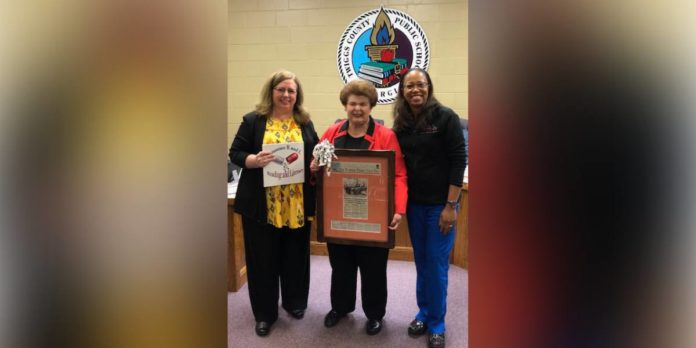MACON – A collaborative reading and literacy project involving Mercer University School of Medicine (MUSM), Twiggs County Public Schools, Twiggs County Health Department and Twiggs County Public Library was named a recipient of the inaugural Georgia School Board Association (GSBA) Leading Edge Awards presented Dec. 5 at the Renaissance Waverly Hotel in Atlanta.
“Vitamins R (Reading) and L (Literacy)” aims to increase the “language nutrition” of 2- and 3-year-old siblings of Twiggs County Public School students identified as having literacy challenges.
The project was one of 48 that received $20,000 Early Language and Literacy Mini-Grants from the Governor’s Office of Student Achievement and the Sandra Dunagan Deal Center for Early Language and Literacy at Georgia College in February 2018.
Monthly meetings at Jeffersonville Elementary School and Twiggs County Public Library have been held to provide children and caregivers with books and healthy food and also to share information such as research findings about reading aloud and increasing the language of young children.
“There are three important literacy opportunities in the early life of a child – the third trimester, 3 years of age and third grade. Our program focused on that middle opportunity and has demonstrated the impact that we can make on their potential for future success,” said Dr. Keisha Callins, Joy McCann Endowed Professor at MUSM and an OB-GYN for Community Health Care Systems in Twiggs County. “As a community-responsive physician, this is an extremely important upstream initiative because research has shown that low literacy is linked to less favorable health outcomes.”
The grant has served more than its originally intended number of 10 families, and discussions are underway regarding how to continue activities at the conclusion of the grant program in December.
Assessment of the children from beginning to end of the 18-month program measures their growth in receptive language (words they understand when they hear them) and expressive language (words they actually can say). Observation and current assessment results show much progress is being made.
“The reward to those working hard to implement this grant has been observing growth in the children and parents participating,” said Dr. Sarah Beck Hawthorne, president of AlphaSkills Inc. in Jeffersonville. “All children were provided both pre- and post-assessments to measure their vocabulary progress. Of those, 2- and 3-year-olds attending 12 or more of the 16 sessions, we hoped to see at least 12 months’ growth. The final results documented 75% of the children met that expectation in expressive language and 100% in receptive language. The grant was indeed a success.”
“The lessons gained from this grant experience will be used as the foundation to implement the next initiative for promoting literacy to our families across the county,” added Dr. Callins.
The focus of the project is to have children reading on grade level by the end of third grade. Recent findings indicate that 65 percent of Georgia third-graders lack necessary vocabulary and reading comprehension skills, and one in six Georgia adults have low literacy skills. Adults with low literacy earn 30 percent less than those with a high school diploma and cost the state an estimated $1.26 billion in social services and lost tax revenue annually.
About Mercer University School of Medicine (Macon, Savannah and Columbus)
Mercer University’s School of Medicine was established in 1982 to educate physicians and health professionals to meet the primary care and health care needs of rural and medically underserved areas of Georgia. Today, more than 60 percent of graduates currently practice in the state of Georgia, and of those, more than 80 percent are practicing in rural or medically underserved areas of Georgia. Mercer medical students benefit from a problem-based medical education program that provides early patient care experiences. Such an academic environment fosters the early development of clinical problem-solving and instills in each student an awareness of the place of the basic medical sciences in medical practice. The School opened a full four-year campus in Savannah in 2008 at Memorial University Medical Center. In 2012, the School began offering clinical education for third- and fourth-year medical students in Columbus. Following their second year, students participate in core clinical clerkships at the School’s primary teaching hospitals: Medical Center, Navicent Health in Macon; Memorial University Medical Center in Savannah; and The Medical Center and St. Francis Hospital in Columbus. The School also offers master’s degrees in family therapy, preclinical sciences and biomedical sciences and a Ph.D. in rural health sciences.









